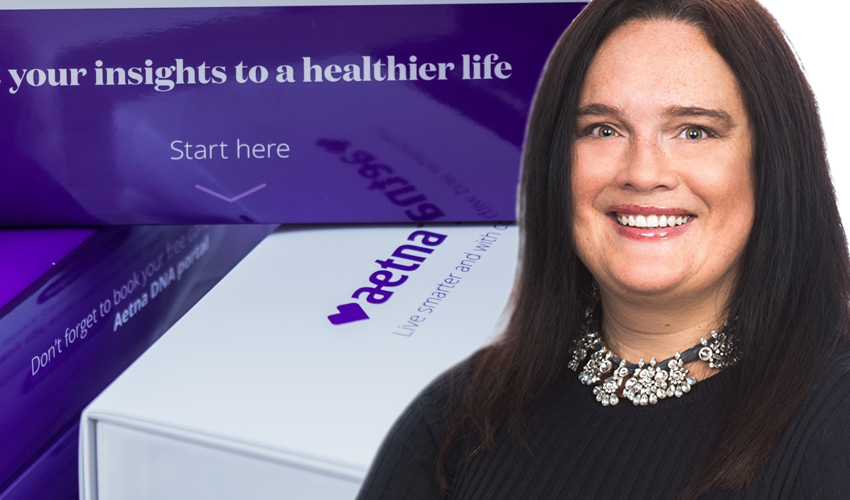We take a look at the now and the future of DNA testing with Aetna International’s Caroline Pain.
Aetna is the first insurer to provide genetics and a link to personal health for their members. advo’s Colin Boxall talks to Aetna International about their launch of DNA testing for their European members, how they benefit, and how the insurer sees the future.
Q. Medical insurance is typically reactive, is this the start of a change of stance for our industry?
We are very excited to introduce this health and lifestyle genetic test as an option for our members, and the response has been phenomenal. The launch of Aetna DNA was inspired by our desire to provide health care that is bespoke and personalised to individuals. We’ve noticed a definite move amongst our members towards taking a proactive approach to looking after their physical, emotional and mental health, so this is something we work hard to support. Developing a member-centric proposition is something we feel passionately about, and this particular development supports our work to achieve this.
In terms of change, it’s certainly the case that science is continually pushing forward the frontiers of knowledge and we’re always keen to use any advancements to benefit of our members. But we’re just as mindful that nothing replaces a human touch when it comes to supporting people’s health goals or making the behavioural changes that they want to.
 Caroline Pain, Senior Vice President, Customer Proposition
Caroline Pain, Senior Vice President, Customer Proposition
Q. How will your members benefit from the DNA testing kit? Will it really change lives as suggested?
The more personalised and predictive the information available, the better the chance of helping people on their path to good health and holistic wellness. Yet clearly, information can only take you so far – it’s down to individuals to decide if and how they’d like to action any behavioural changes. Nonetheless, there is evidence to suggest that the positive impact from finding out more about your genetics can be truly life-changing. For example, one study in Finland tracked 7300 people, who had received genetic risk information, over an 18 month period. It found that 88% of participants were inspired to take better care of their health and around a fifth of those who smoked managed to give up. It goes to show that knowledge can be empowering when it comes to staying engaged in your own health.
Q. Will you guide your members to understand their results?
One of the unique things about our approach is that there is an abundance of comprehensive, easy to access and professional advice available after people take the test. The written reports that are sent out, containing results on nutrigenomics (how your body responds to foods and nutrients), fitness, sleep and stress, are intentionally user-friendly to understand, with colourful infographics to bring results to life. We also offer a variety of routes for further guidance afterwards. Members can book a consultation appointment to talk to a nutritionist or fitness specialist about results or any changes they may like to make. Then follow-up assistance can be accessed from a number of our well-being resources, including health coaching, our employee assistance programme and vHealth, our virtual health care service.
Q. How can you ensure quality of results of the testing kits?
Reliability and accuracy are of paramount importance to us and to our members. We meticulously selected our partner for this venture, Prenetics International, to make sure we were confident that the highest quality standards and effective protocols would be in place for the whole process. As well as a sterling reputation, Prenetics International owns and operates its own DNA laboratory and has had external validation completed by the Core Facilities Genome Sequencing Laboratory (CFGSL), with proven genotyping accuracy of 99.9%.
Q. Competitors are likely to say this is a gimmick, how would you respond?
There’s a huge buzz around genetics and it’s exciting to offer our members something a bit different, but it boils down to the fact that we’re at the forefront of a culture transformation from ‘sick care’ to one of ‘well care’. Our desire is to support our members on the road to holistic well-being as robustly and comprehensively as possible. We know that, rather than being passive recipients of health services, people are taking increasing amounts of responsibility and want to play an active role in maintaining or improving their health. A genetic test that yields information on lifestyle and nutrition is one way of getting personalised information that can help. It’s important to understand that DNA testing isn’t the end of the story – it’s only the beginning. It’s what you do with that information that will make the biggest difference.
Q. How do you see the future role of genetics within health insurers? What are the next steps?
We are seeing a global shift towards value-based care, where payers are increasingly becoming providers. Patients are becoming consumers and demanding more seamless, personal, convenient and holistic care. And, we are also facing a growing challenge in healthcare globally, with ageing populations, a huge increase in the incidence of NCDs and massive pressure on primary care. So, I think the traditional role of health insurers is changing – we have a responsibility to engage in the broader health of populations, and we need to find ways to work with other healthcare providers and other industries to keep people healthy – and address lifestyle issues. And genetics will undoubtedly play a part in this. However, there are so many different disciplines within genomics and it’s an ever-changing, fast-paced sector, it’s impossible to predict with any accuracy what will happen in the future – so for now, we are measuring how our members respond to and engage with this information. We’re also aware that we need to prove trust and integrity as an industry, just as in any situation when you are dealing with personal, sensitive data. We take our responsibilities in this area very seriously.
Q. Do you think DNA testing will ever form part of an on-boarding process for new members, replacing underwriting through a medical questionnaire?
It’s important to remember that Aetna DNA is being offered as a supplement to the wide-ranging resources we already provide, and it’s also optional. The aim isn’t to replace anything. We know that eating well, reducing stress levels, exercising regularly and getting enough quality sleep are the foundations that optimal health – both physical and mental – is built on. This test is a discretionary method to give more insight and clarity around your unique sensitivities in these areas, should you want to know. In other words, it offers an additional way to help members make informed decisions.
Q. What’s next for Aetna?
Our vision of health care is built around the 4 Ps – predictive, preventative, personalised and
participatory. This strategy is designed to offer the individual the right intervention, at the right time, in the right place for them. It can significantly reduce the burden on primary care and allows people to live fuller and healthier lives. In order to realise this vision, we continue to combine the latest advance in technology and science with our very human approach. Consultations, face-to-face time and follow-ups are still of utmost importance. Our members are at the heart of everything we do, so we remain focused on delivering personal, accessible and affordable health care to more people around the world.
To find out more about Aetna International visit https://www.aetnainternational.com/ or email Jamie Tuffield advo’s head of employee benefits on jtuffield@advo.co.uk


